Noa Lazimi, former research coordinator at the Institute for Zionist Strategies (IZS) proposes a new approach to tackling the alarming levels of crime, poverty and terrorism prevalent in East Jerusalem. For too long, the stasis in the peace process and the dogma that refuses all reforms for fear of ‘normalising the occupation’ has paralysed efforts to address unmet basic needs in Arab East Jerusalem. The small-scale success of the bottom-up civil society projects run in recent years by the IZS suggests policy-makers should seek to create an alternative model of co-existence and civil partnership between Arabs and Jews in the city.
For many years, the future of the West Bank/Judea and Samaria, has been at the centre of domestic and international controversy over Israel’s policies. Yet as much as this is an issue of paramount concern, the tireless debate surrounding it has obscured a relatively more solvable and local challenge: the situation in East Jerusalem.
Annexed by Israel in 1967 from Jordan, this 70 square kilometer area is home to approximately 320,000 Palestinians and 211,000 Jews – all of whom live within Jerusalem’s municipal boundaries. This area is not limited to the Arab neighbourhoods in the eastern part of the city but also includes Arab and Jewish areas located in the northern and southern parts of Jerusalem, among which are: The Old City, Mount of Olives, Mount Scopus, Silwan, Wadi-Joz, Jabel Mukaber and others.
A short stroll through some Arab neighbourhoods reveals a rather dire picture: garbage piling up on the streets, residential buildings in disarray, broken sidewalks, and playgrounds nowhere to be seen. Even worse, rampant crime and terrorism have intensified the feeling of insecurity among residents.
Admittedly, this is partially the result of neglect and lack of investment by Israel’s governments (left and right wing). Nevertheless, it is also true that Israeli authorities have not been well received, to say the least, in large parts of these neighbourhoods, which makes it extremely difficult to properly enforce law and order and provide essential services for the population.
However, the traditionally low level of official Israeli presence has only increased the hostility towards the Israeli government and kept entire communities disbelieving of the idea of effective Israeli rule. Meanwhile, other entities such as the Palestinian Authority, Islamic radical movements, and even countries like Turkey have gained footholds in East Jerusalem. These bodies have worked tirelessly to undermine Israeli sovereignty through violent anti-Israeli messages, distribution of disinformation, and intimidation towards anyone willing to cooperate with Israeli initiatives to improve the living conditions in East Jerusalem.
Current right-wing and centre-left policy proposals
In recent years, politicians and analysts on the Israeli centre-left have called for the partition of Jerusalem as the optimal solution to the above-mentioned problems. In a speech at the Institute for National Security Studies (INSS) in January 2016, the former leader of the Zionist Union, Isaac Herzog, presented a plan to separate from ‘as many Palestinians and as quickly as possible’, referring to the Palestinian village Isawiya and Shuafat Refugee Camp.
Following in Herzog footsteps, MK Yoel Hasson, also of the Zionist Union – proposed a plan for unilateral disengagement from Palestinian villages that were annexed in 1967 but which had historically never been part of the city, and which number 200,000 people. According to Hasson’s bill, the population of those villages would lose their status as residents of Jerusalem. While some critics on the centre-left argued that unilateral moves would sabotage the chances for reaching a two-state solution, Herzog and other politicians explained that because Jerusalem is already de-facto divided, the most important thing is to ensure security by disengaging from these villages (and this doesn’t contradict the aim of reaching a two state solution).
In contrast, thinkers on the right of the political spectrum have been traditional proponents of territorial integrity i.e. maintaining Jerusalem as the eternal indivisible capital of Israel. The former Minister of Education, Naftali Bennet, together with MK Shuli Mualem, introduced a bill to thwart attempts to alter Jerusalem’s municipal boundaries, even in the case in which a political arrangement is being negotiated. The bill, which passed in January 2018, states that any plan to make changes to the territory of the Capital must receive the support of at least 80 MKs to pass. Like their counterparts on the centre-left, rightwing politicians also realise that removing municipal responsibility from certain neighbourhoods could potentially lift the financial burden from the municipality’s shoulders, however, they generally reject the idea of handing them to the PA.
The rationale behind this is three-fold. Firstly, from a humanitarian perspective, proposals to disengage ignore the damage that could be inflicted on the urban fabric of life of thousands of the city’s residents. Moreover, they seemingly do not take into account the simple logic that once such a proposal is publicly declared, the Arab residents living on the other side of the security fence would simply cross over to the ‘Israeli’ side en-masse, inundating those neighbourhoods. Thus, while proposals to divorce from certain neighbourhoods may sound tempting, it will ultimately prove useless. Most importantly, plans to disengage unilaterally, even if executed successfully, could bear harmful consequences in the future. Those territories would be out of reach of Israeli control, which would subsequently encourage more radicalisation and strengthen the PA’s grip and influence over these areas.
Alternatively, some bills by rightwing politicians suggest a middle way in the form of an administrative partition (rather than absolute disengagement): forming independent Arab municipalities for these villages. This would mean that their residents would no longer be residents of Jerusalem but remain under Israeli control. Others propose extending the city’s jurisdiction to include some major settlements blocs, in order to strengthen the Jewish grip over Jerusalem and simultaneously weaken the potential electoral power of the Arab residents.
In any case, none of these proposals, by right or centre left, has had much impact in practice, and so the status quo has been maintained in Jerusalem.
A viable solution for East Jerusalem
If the ‘partition model’ bears harmful consequences, it is worthwhile considering a different strategy to tackle the alarming levels of crime, poverty and terrorism prevalent in East Jerusalem, one that tries to create an alternative model of co-existence and civil partnership between Arabs and Jews.
Policymakers’ focus needs to be shifted from the national debate over settlements and borders to the day-to-day challenges that have the most impact on residents’ quality of life. These include housing, building permits, infrastructure, education, and above all personal safety. That does not mean that we should disregard the big questions of the conflict. Rather, it involves agreeing not to let them paralyse our efforts to create a better reality in Jerusalem today.
Security
As a first step, the State of Israel must ensure security to prevent the alarming rise of chaotic ‘no go’ zones in which there is no respect for either law and order or the authority of Israeli institutions. Indeed, in the last two years and as part of a multi-annual plan for 2016-2020 to enhance security in the Arab sector and the district of Jerusalem, Israel has opened new police stations in Shuafat and Sur-Baher.
Services and Welfare
However, there has also been an understanding by policy makers and civil society organisations that policing is not enough to build bridges between populations. In recent years, Israel has also allocated resources to open police-operated Integrated Service Centres which provide policing and municipal and governmental services under the auspices of Jerusalem Municipality. The idea is to build trust between the Arab residents and Israeli security forces in a daily reality that is all often characterised by tension and hostility.
The Israeli government also needs to revisit its welfare policy towards the Arab residents of East Jerusalem. In practical terms this means allocating government and municipal resources to the needs of the Arab residents in proportion to their share in the city population as well as making services more accessible. For example, as of 2013, the budget allocated for the Palestinian residents of the city, who comprise 37 per cent of its population, was estimated at 10 per cent of the total municipality budget. However, in the last decade, East Jerusalem has become a national concern and accordingly, recent government decisions on a national level have channeled vast amounts of money to social services in the Arab areas, primarily education, in order to assist the municipality in improving the living conditions of its Arab population.
Liberal-National Values
This mission also stands at the centre of the Institute for Zionist Strategies (IZS), a centre-right leaning think tank which was founded in 2005 with the goal of strengthening the character of Israel as both Jewish and democratic. The IZS believes that in any place where Israel is sovereign, ‘it should be held responsible to ensure that the Arab residents under its rule enjoy the rights and services they are entitled to.’
Based on this principle, in October 2018, IZS opened a rights centre in Sur-Baher with the goal of increasing awareness among Arab residents of their rights and available social benefits. Volunteers received multiple requests daily to help residents navigate the Israeli bureaucracy as they pay their bills, request a property tax discount, or register their children in school. The IZS also conducts Hebrew lessons for Arab women and youth who believe that learning Hebrew is the fastest way to help them integrate, apply for jobs and function in the city in which they live. Demand for these language classes is high and rising.
These IZS-led initiatives are not isolated enterprises. They are part of its broader plan to piece together the eastern and western parts of Jerusalem. It has received the support of the municipality and been advanced by collaboration with senior figures in diverse Israeli authorities which have welcomed the assistance they get on the ground. In one year only, the reach of the IZS’ activity expanded from one to five different neighbourhoods in East Jerusalem, and now, it is planning to open another rights centre in Abu-Tor as well as additional Hebrew classes this year, in response to the high demand.
Driven by liberal-national values and its commitment to ensure the liberal democratic values held by the founders of Zionism, the IZS’ work in East Jerusalem is a corollary of its previous civil rights projects. For example, for the last five years, the IZS has been helping thousands of Palestinians during their morning entry into Israel from the Palestinian Authority via the IDF crossings at the ‘Jerusalem Envelope Road’.
Our approach has been criticised on both the Israeli left and right. Because the IZS advocates for firm Israeli sovereignty and supports legislation that strengthens Israeli national identity – including the nation state law, which was initiated and promoted by IZS members[i] – some argue its activities are trying to ‘normalise the occupation’. Others on the right criticise the projects for putting Palestinian rights at the centre, while they argue there are other pressing needs within Israeli society that should be prioritised.
By contrast, these IZS bottom-up efforts have been met with a genuine desire for collaboration by the affected Palestinian population in East Jerusalem and have also actively involved local community leaders, most notably Ramadan Dabash, who recently ran for the Jerusalem city council. Although the vast majority of Palestinian Jerusalem residents still do not vote, Dabash argues that most residents he meets do not want to give up their current status to live under the PA. In short, they prefer to live under Israeli rule. He stresses the importance of cooperating with the Israeli authorities for the benefit of the Arab population: ‘We need to speak about infrastructure and services for the residents. We need to work with the ruler, and for the past 50 years that has been the State of Israel’.
In this context, the recent initiatives by the Israeli government and organisations like the IZS reflect a positive change in attitudes towards East Jerusalem and indicate the possibility of a new response to the complex reality of this area, rooted in the understanding that in order to create a better reality, the question of what a future peace deal would ultimately look like should be bypassed and, instead, more immediate and pressing matters of unmet need addressed. This is not to say that we should not strive for a peaceful political resolution for the two peoples, Jews and Palestinians in the future. Rather, it is to insist that the current absence of such a resolution should not block us from improving the well-being of the two communities today.
[i] The IZS believes that the values of equality and minority rights should be given important weight and anchored in legislation, but in separate legislation to the nation state law.

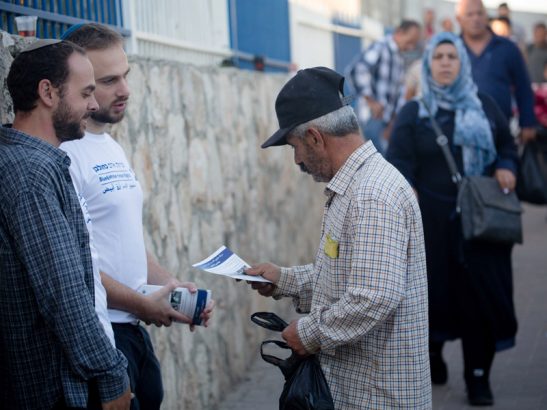

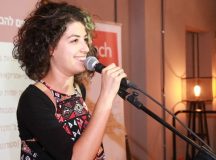
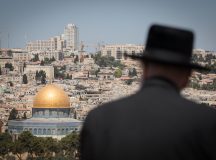

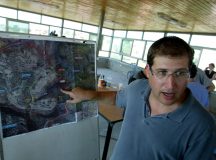
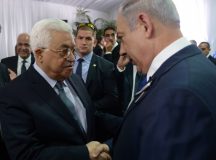































As to this point – “As a first step, the State of Israel must ensure security to prevent the alarming rise of chaotic ‘no go’ zones in which there is no respect for either law and order or the authority of Israeli institutions” – I would suggest seeing how the progressive left-wing groups and platforms relate to the attempts to accomplish the above goal in Issawiya. They lambast the police, justify all Arab acts of violence and basically lend support to lawlessness, justifying it simply as “resistance protest” and b;laming the police as if they initiated matters.